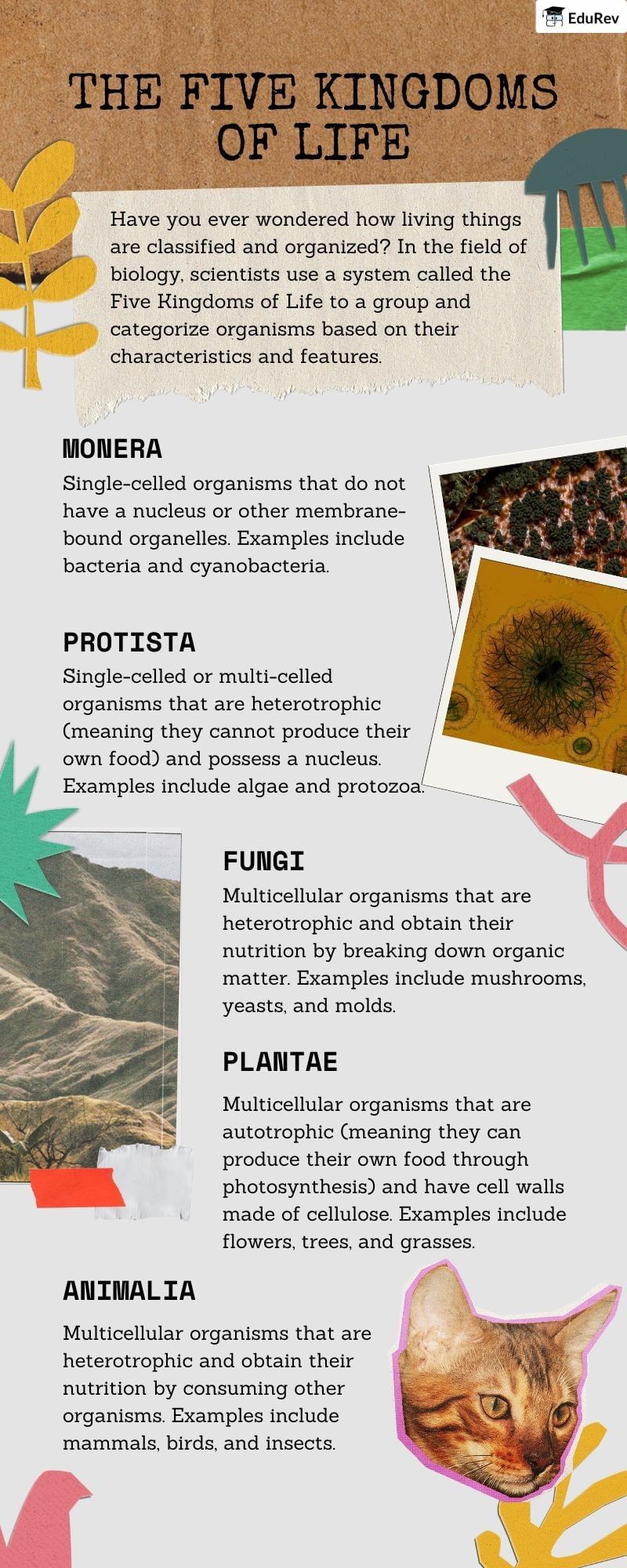NEET Exam > NEET Notes > Biology Class 11 > Infographics: Five Kingdom Classification
Infographics: Five Kingdom Classification | Biology Class 11 - NEET PDF Download

The document Infographics: Five Kingdom Classification | Biology Class 11 - NEET is a part of the NEET Course Biology Class 11.
All you need of NEET at this link: NEET
|
150 videos|399 docs|136 tests
|
FAQs on Infographics: Five Kingdom Classification - Biology Class 11 - NEET
| 1. What are the five kingdoms in the Five Kingdom Classification system? |  |
Ans. The Five Kingdom Classification system includes the following kingdoms: Monera, Protista, Fungi, Plantae, and Animalia. Monera consists of prokaryotic organisms like bacteria, Protista encompasses unicellular eukaryotic organisms, Fungi includes multicellular and unicellular fungi, Plantae consists of multicellular plants, and Animalia includes multicellular animals.
| 2. Who proposed the Five Kingdom Classification and when? |  |
Ans. The Five Kingdom Classification system was proposed by Robert Whittaker in 1969. This system was a significant advancement in the classification of living organisms, as it provided a clearer and more systematic arrangement based on cellular organization, nutrition, and reproductive methods.
| 3. What criteria are used to classify organisms into the five kingdoms? |  |
Ans. Organisms are classified into the five kingdoms based on several criteria including cellular structure (prokaryotic or eukaryotic), the mode of nutrition (autotrophic or heterotrophic), the complexity of the organism (unicellular or multicellular), and reproductive methods. These criteria help in distinguishing the vast diversity of life forms.
| 4. How does the Five Kingdom Classification differ from earlier classification systems? |  |
Ans. The Five Kingdom Classification differs from earlier systems, such as the Two Kingdom Classification (Plantae and Animalia), by introducing a more comprehensive approach that recognizes the significant differences among microorganisms and fungi. It provides a clearer distinction between prokaryotic and eukaryotic organisms and includes kingdoms for fungi and protists, which were often overlooked in earlier systems.
| 5. Why is the Five Kingdom Classification important for biological studies? |  |
Ans. The Five Kingdom Classification is important for biological studies as it helps scientists understand the relationships between different organisms and their evolution. By categorizing life forms into distinct kingdoms, researchers can study their characteristics, ecological roles, and interactions, which is essential for fields like ecology, conservation, and microbiology.
Related Searches
















